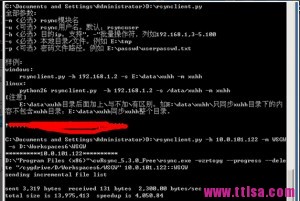rsync 代码分发
作者:服务器运维 • 更新时间:2023-07-27 •
线上服务器既有Windows又有Linux的,代码的分发更新要规划下了。使用rsync来分发代码,同时考虑到不同系统平台,用法有些不同。将rsync命令进行了下封装,执行脚本即可。方便开发人员使用。
1. rsync服务端配置
# yum install rsync
# vim /etc/rsyncd.conf
uid = nobody
gid = nobody
use chroot = no
strict modes = no
max connections = 5
charset=utf8
secrets file = /etc/rsyncd.secrets
reverse lookup = no
transfer logging = yes
log format = %t [%p] %o %a %m %P %f %B %M %l (%u) [%C]
log file = /var/log/rsyncd.log
pid file = /var/run/rsyncd.pid
hosts allow = 10.0.100.162
hosts deny = *
[www_ttlsa_com]
path=/data/webroot/www.ttlsa.com
comment = WSGW
read only = no
ignore errors
exclude = .svn/
dont compress = *.gz *.tgz *.zip *.z *.bz2 *.tbz
# vim /etc/rc.local
rsync --daemon
2. 客户端
这里只说下Windows下的rsync用法,其实和Linux下相同,Windows上要安装cwRsync,同时将Python2.7也安装上,因为后面的Python脚本需要使用到Python环境。
# vim rsyncclient.py
#coding:utf-8
import sys
import os
import getopt
import itertools
import subprocess
import thread
import Queue
import platform
if platform.system()=='Windows':
_bin_path=r'D:\"Program Files (x86)"\cwRsync_5.3.0_Free\rsync.exe'
else:
_bin_path='rsync'
_default_user='rsyncuser'
_default_arg='-vzrtopg --progress --delete'
_thread_num=10
_help_d={'-s':'(必选) 本地目录/文件。例如 E:\\tmp',
'-h':'(必选) 目的ip。支持", -"批量操作符,例如192.168.1,3-5.100',
'-m':'(必选) rsync模块名',
'-u':'(可选) rsync用户名。默认:%s'%(_default_user),
'-p':'(可选) 密码文件路径。例如 E:\\passwd\\userpasswd.txt'}
_help='\r\n'.join(['%s %s'%(k,v) for (k,v) in _help_d.iteritems()])
_help='全部参数:\r\n'+_help
_help+='''\r\n\r\n样例:
windows:
rsynclient.py -h 192.168.1.2 -s E:\\data\\xuhh -m xuhh
linux:
python26 rsynclient.py -h 192.168.1.2 -s /data/xuhh -m xuhh
[注意]
E:\\data\\xuhh目录后面加上\\与不加\\有区别。如E:\\data\\xuhh\\只同步xuhh目录下的内容不包含xuhh目录;E:\\data\\xuhh同步xuhh整个目录.'''
_help+='\r\n\r\n'
def check_num(func):
def t(arg):
arg=arg.replace(' ','')
res=[x for x in [',','-'] if arg.startswith(x) or arg.endswith(x)]
if res:
raise NUMARG_ERROR('ip格式错误!')
err_arg=[',-','-,','--',',,']
res=[x for x in err_arg if x in arg]
if res:
raise NUMARG_ERROR('ip格式错误!')
return func(arg)
return t
class NUMARG_ERROR(Exception):
def __init__(self,value):
self.value=value
def __str__(self):
return self.value+'\r\n\r\n'+_help
class ARG_ERROR(Exception):
def __init__(self,value):
self.value=value
def __str__(self):
return self.value+'\r\n\r\n'+_help
def catch_exception(func):
def t(*args,**kwargs):
try:
return func(*args,**kwargs)
except NUMARG_ERROR,e:
return e.__str__()
except ARG_ERROR,e:
return e.__str__()
except getopt.GetoptError,e:
return '-%s %s\r\n\r\n%s'%(e[1],_help_d['-'+e[1]],_help)
except:
import cStringIO
import traceback
err_fp = cStringIO.StringIO()
traceback.print_exc(file=err_fp)
err_msg = err_fp.getvalue()
err_msg='\r\n'.join(err_msg.split( '\n'))
#self.response.out.write(err_msg)
return err_msg
return t
@check_num
def extend_num(arg):
res=[]
if ',' in arg:
s=arg.split(',')
for x in s:
if '-' in x:
y=[ str(xx).decode('utf-8') for xx in range(int(x.split('-')[0].strip()),int(x.split('-')[1].strip())+1)]
res.extend(y)
else:
res.append(x.strip())
elif '-' in arg:
x=arg
y=[ str(xx).decode('utf-8') for xx in range(int(x.split('-')[0].strip()),int(x.split('-')[1].strip())+1)]
res.extend(y)
else:
res.append(arg.strip())
res=dict.fromkeys(res).keys()
res.sort()
return res
def to_rsync_path(path):
if platform.system()=='Windows':
rsync__path=os.path.abspath(path)
rsync__path=rsync__path.replace('\\','/')
rsync__path=rsync__path.replace(':','')
rsync__path='/cygdrive/'+rsync__path
if path.endswith('\\'):
rsync__path+='/'
return rsync__path
else:
return path
@catch_exception
def run(*argv):
opts,args=getopt.getopt(argv,'h:m:s:u:p:')
kwargs=dict(opts)
#检查参数是否足够
if not kwargs.has_key('-h') or not kwargs.has_key('-s') or not kwargs.has_key('-m'):
raise ARG_ERROR('参数不足!')
print '--help'
if kwargs.has_key('-u') and not kwargs.has_key('-p'):
raise ARG_ERROR('密码参数-p没有指定!')
#使用默认用户认证
if kwargs.has_key('-p') and not kwargs.has_key('-u'):
kwargs['-u']=_default_user
#将路径转换为rsync能识别的格式
kwargs['-s']=to_rsync_path(kwargs['-s'])
if kwargs.has_key('-p'):
kwargs['-p']=to_rsync_path(kwargs['-p'])
#扩展ip
ips=[]
try:
ip_seq1,ip_seq2,ip_seq3,ip_seq4=kwargs['-h'].split('.')
for num1,num2,num3,num4 in itertools.product(extend_num(ip_seq1),extend_num(ip_seq2),extend_num(ip_seq3),extend_num(ip_seq4)):
ips.append('%s.%s.%s.%s'%(num1,num2,num3,num4))
except:
raise NUMARG_ERROR('ip格式错误!')
#启动线程
queue=Queue.Queue()
for x in range(_thread_num):
thread.start_new_thread(_work_thread,(queue,))
for ip in ips:
if kwargs.has_key('-u'):
cmd='%s %s "%s" %s@%s::%s --password-file=%s'%(_bin_path,_default_arg,kwargs['-s'],kwargs['-u'],ip,kwargs['-m'],kwargs['-p'])
else:
cmd='%s %s "%s" %s::%s'%(_bin_path,_default_arg,kwargs['-s'],ip,kwargs['-m'])
queue.put([ip,cmd])
queue.join()
def _work_thread(queue):
while True:
ip,cmd=queue.get()
output=subprocess.Popen(cmd.encode('cp936'),shell=True, stdout=subprocess.PIPE, stderr=subprocess.STDOUT).stdout.read()
output= '**********%s**********\r\n%s\r\n%s'%(ip,cmd,output)
if platform.system()=='Windows':
output=output.decode('utf-8').encode('cp936')
print output
queue.task_done()
if __name__=='__main__':
argv=sys.argv[1:]
if argv:
res=run(*argv)
if res:
if platform.system()=='Windows':
res=res.decode('utf-8').encode('cp936')
print res
else:
if platform.system()=='Windows':
_help=_help.decode('utf-8').encode('cp936')
print _helpIP支持192.168.1,3-5.100,111-122这种写法。
3. 用法

本文由主机测评网发布,不代表主机测评网立场,转载联系作者并注明出处:https://zhuji.jb51.net/yunwei/8163.html

